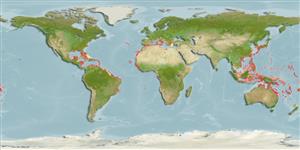Environment: milieu / climate zone / depth range / distribution range
Ecology
Marine; reef-associated; depth range 0 - 10 m (Ref. 9710). Tropical
Western Atlantic: Bermuda, Florida (USA), and northern Gulf of Mexico to Brazil. Eastern Atlantic: Mauritania and the Canary Islands to about South Africa. Also known in the southern parts of Mediterranean, including the following most southern localities of the northern coast: Torremolinos and Taramay near Motril (Spain), Sicily, Kyra Island (Gulf of Aigina) and near Palaea Epidavros, Peloponnes (Greece) (Ref. 5298). Northwest Pacific: Japan (Ref. 559, 9137, 35771) and Taiwan.
Size / Weight / Age
Maturity: Lm ? range ? - ? cm
Max length : 12.0 cm TL male/unsexed; (Ref. 13628)
Dorsal spines (total): 12; Dorsal soft rays (total): 14 - 15; Anal spines: 2; Anal soft rays: 14 - 17. Resembles P. yatabei but easily distinguished by a median series of cirri on nape. A short supraorbital cirrus present (Ref. 559). Dull green or olive with dark bars on body which extend into lower part of dorsal fin (Ref. 13442).
Adults inhabit shallow rocky areas and tide pools. They hide in empty Strombus gigas shells (Ref. 13628), holes or troughs of rocks, or between algae (Ref. 5981). Herbivorous (Ref. 13442). Feed on invertebrates as juveniles and shift to diet of algae as adults (Ref. 94105). Unusual erectile nuchal crest (Ref. 41019). Oviparous. Eggs are demersal and adhesive (Ref. 205), and are attached to the substrate via a filamentous, adhesive pad or pedestal (Ref. 94114). Larvae are planktonic, often found in shallow, coastal waters (Ref. 94114).
Life cycle and mating behavior
Maturity | Reproduction | Spawning | Eggs | Fecundity | Larvae
Oviparous, distinct pairing (Ref. 205).
Robins, C.R. and G.C. Ray, 1986. A field guide to Atlantic coast fishes of North America. Houghton Mifflin Company, Boston, U.S.A. 354 p. (Ref. 7251)
IUCN Red List Status (Ref. 130435: Version 2024-1)
Threat to humans
Harmless
Human uses
Fisheries: of no interest; aquarium: commercial
Tools
Special reports
Download XML
Internet sources
Estimates based on models
Preferred temperature (Ref.
123201): 19.3 - 29.1, mean 27.4 °C (based on 3129 cells).
Phylogenetic diversity index (Ref.
82804): PD
50 = 0.5078 [Uniqueness, from 0.5 = low to 2.0 = high].
Bayesian length-weight: a=0.01047 (0.00593 - 0.01849), b=2.95 (2.80 - 3.10), in cm total length, based on LWR estimates for this species & (Sub)family-body (Ref.
93245).
Trophic level (Ref.
69278): 2.5 ±0.1 se; based on diet studies.
Resilience (Ref.
120179): High, minimum population doubling time less than 15 months (Preliminary K or Fecundity.).
Fishing Vulnerability (Ref.
59153): Low vulnerability (10 of 100).
Nutrients (Ref.
124155): Calcium = 121 [68, 196] mg/100g; Iron = 0.837 [0.517, 1.314] mg/100g; Protein = 18.6 [17.5, 19.6] %; Omega3 = 0.129 [0.081, 0.206] g/100g; Selenium = 19.4 [11.4, 35.1] μg/100g; VitaminA = 119 [39, 369] μg/100g; Zinc = 2.16 [1.51, 2.99] mg/100g (wet weight);
